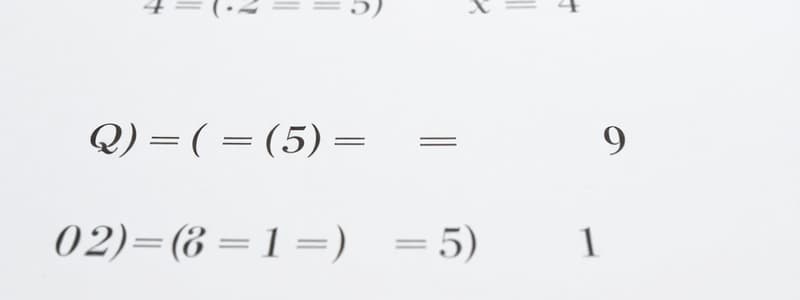Podcast
Questions and Answers
Which of the following statements best illustrates the use of a universal quantifier?
Which of the following statements best illustrates the use of a universal quantifier?
- Every cloud has a silver lining. (correct)
- Many people find happiness in simple things.
- At least one person in the room is a doctor.
- Some students enjoy mathematics.
Which statement exemplifies an existential quantifier?
Which statement exemplifies an existential quantifier?
- Each child received a gift.
- Every citizen has the right to vote.
- All roses are red.
- There exists a planet with liquid water. (correct)
Which of the following sentences uses a numerical quantifier?
Which of the following sentences uses a numerical quantifier?
- All cars have wheels.
- Exactly five players scored in the game. (correct)
- Some birds fly south for the winter.
- Every book has a cover.
In the sentence, 'Every dog chased a squirrel,' how does the scope of the quantifiers affect the interpretation?
In the sentence, 'Every dog chased a squirrel,' how does the scope of the quantifiers affect the interpretation?
What is the logical negation of the statement 'All students passed the exam'?
What is the logical negation of the statement 'All students passed the exam'?
How is the statement 'For all x in set S, P(x) is true' represented using bounded quantifiers?
How is the statement 'For all x in set S, P(x) is true' represented using bounded quantifiers?
Which of the following is an example of a generalized quantifier?
Which of the following is an example of a generalized quantifier?
If ¬(∃x P(x)) is true, which of the following statements is also true?
If ¬(∃x P(x)) is true, which of the following statements is also true?
What does the expression ∀x (x ∈ A → x ∈ B) mean in terms of set theory?
What does the expression ∀x (x ∈ A → x ∈ B) mean in terms of set theory?
Which of the following SQL clauses can be considered to use a quantifier?
Which of the following SQL clauses can be considered to use a quantifier?
How do quantifiers contribute to the challenge of understanding natural language sentences in Natural Language Processing?
How do quantifiers contribute to the challenge of understanding natural language sentences in Natural Language Processing?
What is the primary purpose of Quantifier Raising (QR) in linguistic theory?
What is the primary purpose of Quantifier Raising (QR) in linguistic theory?
Which of the following best describes quantificational logic?
Which of the following best describes quantificational logic?
How does vagueness interact with quantifiers in natural language?
How does vagueness interact with quantifiers in natural language?
Which logical expression accurately represents the statement, 'There is someone who loves every person'?
Which logical expression accurately represents the statement, 'There is someone who loves every person'?
What is the correct interpretation of the expression $¬(∀x P(x))$?
What is the correct interpretation of the expression $¬(∀x P(x))$?
In modal logic, how would you express 'It is possible that there exists a unicorn'?
In modal logic, how would you express 'It is possible that there exists a unicorn'?
What distinguishes quantificational logic from propositional logic?
What distinguishes quantificational logic from propositional logic?
Consider the statement: 'Most tall people are good at basketball'. What aspect of this statement contributes to its vagueness?
Consider the statement: 'Most tall people are good at basketball'. What aspect of this statement contributes to its vagueness?
How can quantifiers be used to define relationships between sets?
How can quantifiers be used to define relationships between sets?
Flashcards
What are Quantifiers?
What are Quantifiers?
Expressions that indicate quantity, specifying how many or how much of something is being referred to.
What are Universal Quantifiers?
What are Universal Quantifiers?
Assert something about every member of a set. Examples include 'all,' 'every,' and 'each'.
What are Existential Quantifiers?
What are Existential Quantifiers?
Assert that there exists at least one member of a set that satisfies a condition. Examples include 'some,' 'at least one,' and 'there exists'.
What are Numerical Quantifiers?
What are Numerical Quantifiers?
Signup and view all the flashcards
What is Quantifier Scope?
What is Quantifier Scope?
Signup and view all the flashcards
What are Multiple Quantifiers?
What are Multiple Quantifiers?
Signup and view all the flashcards
What are Quantifiers in Logic?
What are Quantifiers in Logic?
Signup and view all the flashcards
What are Bounded Quantifiers?
What are Bounded Quantifiers?
Signup and view all the flashcards
What are Generalized Quantifiers?
What are Generalized Quantifiers?
Signup and view all the flashcards
What is Quantifier Negation?
What is Quantifier Negation?
Signup and view all the flashcards
Quantifiers and Set Theory?
Quantifiers and Set Theory?
Signup and view all the flashcards
Quantifiers in Natural Language Processing?
Quantifiers in Natural Language Processing?
Signup and view all the flashcards
Quantifiers in Database Queries?
Quantifiers in Database Queries?
Signup and view all the flashcards
What is Quantifier Raising (QR)?
What is Quantifier Raising (QR)?
Signup and view all the flashcards
What is Quantificational Logic?
What is Quantificational Logic?
Signup and view all the flashcards
Quantifiers and Vagueness?
Quantifiers and Vagueness?
Signup and view all the flashcards
Quantifiers in Modal Logic?
Quantifiers in Modal Logic?
Signup and view all the flashcards
Study Notes
- Quantifiers are expressions that indicate quantity.
Types of Quantifiers
- Universal quantifiers assert something about every member of a set.
- Existential quantifiers assert that there exists at least one member of a set that satisfies a condition.
- Numerical quantifiers specify an exact or approximate quantity.
Universal Quantifiers
- Examples include "all", "every", and "each".
- "All cats are mammals" means that for every entity, if that entity is a cat, then that entity is a mammal.
- "Every student must take the exam" indicates that each individual who is a student is required to take the exam.
Existential Quantifiers
- Examples include "some", "at least one", and "there exists".
- "Some dogs are friendly" means that there exists at least one dog that is friendly.
- "There exists a prime number greater than 100" asserts the existence of such a prime number.
Numerical Quantifiers
- Examples include "one", "two", "three", "many", "few", and "most".
- "Exactly three students failed the test" specifies a precise quantity.
- "Many birds fly south for the winter" indicates a large quantity of birds, without specifying an exact number.
- "Few politicians are trusted" indicates a small quantity of politicians.
- "Most people enjoy music" indicates that a majority of people enjoy music.
Quantifier Scope
- Quantifier scope refers to the portion of a sentence over which the quantifier has influence.
- The scope of a quantifier determines how the sentence is interpreted when multiple quantifiers are present.
- Example: "Every student read a book." The interpretation changes depending on whether "every student" is read before "a book", or vice versa.
- Reading "every student" first suggests each student may have read a different book.
- Reading "a book" first suggests there's one specific book that all students read.
Multiple Quantifiers
- Sentences with multiple quantifiers can have ambiguous meanings depending on the order and scope of the quantifiers.
- The order in which quantifiers appear affects the meaning of the sentence.
- Example: "For every person, there is someone who loves them." vs. "There is someone who loves every person." These have very different meanings though they use the same quantifiers and predicates.
Quantifiers in Logic
- In formal logic, quantifiers are symbols that express the extent to which a predicate is true over a range of elements.
- The universal quantifier is typically denoted by ∀, and the existential quantifier by ∃.
- ∀x P(x) means "for all x, P(x) is true."
- ∃x P(x) means "there exists an x such that P(x) is true."
Bounded Quantifiers
- Bounded quantifiers restrict the range of elements over which the quantifier operates.
- Example: ∀x∈S P(x) means "for all x in set S, P(x) is true."
- ∃x∈S P(x) means "there exists an x in set S such that P(x) is true."
Generalized Quantifiers
- Generalized quantifiers extend the notion of standard quantifiers to include a wider range of quantification.
- Examples include "most", "few", "many", and numerical quantifiers.
- These quantifiers cannot be easily expressed in first-order logic.
Quantifier Negation
- The negation of a universally quantified statement is an existentially quantified statement.
- The negation of an existentially quantified statement is a universally quantified statement.
- ¬(∀x P(x)) is equivalent to ∃x ¬P(x).
- ¬(∃x P(x)) is equivalent to ∀x ¬P(x).
Quantifiers and Set Theory
- Quantifiers are used to define properties of sets.
- ∀x (x ∈ A → x ∈ B) means that set A is a subset of set B.
- ∃x (x ∈ A ∧ x ∈ B) means that the intersection of sets A and B is non-empty.
Quantifiers in Natural Language Processing
- Quantifiers are important for understanding the meaning of natural language sentences.
- Identifying and resolving the scope of quantifiers is a challenging problem in NLP.
- Quantifier scope ambiguity can lead to different interpretations of a sentence.
Quantifiers in Database Queries
- Quantifiers are used in database queries to retrieve data that satisfies certain conditions.
- SQL uses quantifiers like "ALL", "ANY", and "EXISTS".
- "SELECT * FROM Students WHERE age > ALL (SELECT age FROM Teachers)" retrieves all students whose age is greater than the age of every teacher.
Quantifier Raising
- Quantifier raising (QR) is a syntactic operation in linguistics where a quantifier phrase is moved to a higher position in the syntactic structure.
- This movement is often proposed to explain the scope ambiguities of quantifiers.
- QR is a theoretical construct used to model how the scope of quantifiers is determined.
Quantificational Logic
- Quantificational logic (also known as predicate logic or first-order logic) is a formal system used to reason about objects and their properties.
- It extends propositional logic by introducing quantifiers, variables, predicates, and functions.
- Quantificational logic is used in mathematics, computer science, and philosophy.
Quantifiers and Vagueness
- Vagueness arises when the boundaries of a concept are not clearly defined.
- Quantifiers can interact with vagueness, leading to borderline cases where it is unclear whether a quantified statement is true or false.
- "Most tall people are good at basketball" is vague because "tall" and "good" are vague predicates.
Quantifiers in Modal Logic
- Modal logic extends classical logic to reason about necessity and possibility.
- Quantifiers can be combined with modal operators to express quantified statements about possible worlds.
- "It is possible that there exists a unicorn" can be expressed using both an existential quantifier and a modal operator.
Studying That Suits You
Use AI to generate personalized quizzes and flashcards to suit your learning preferences.




